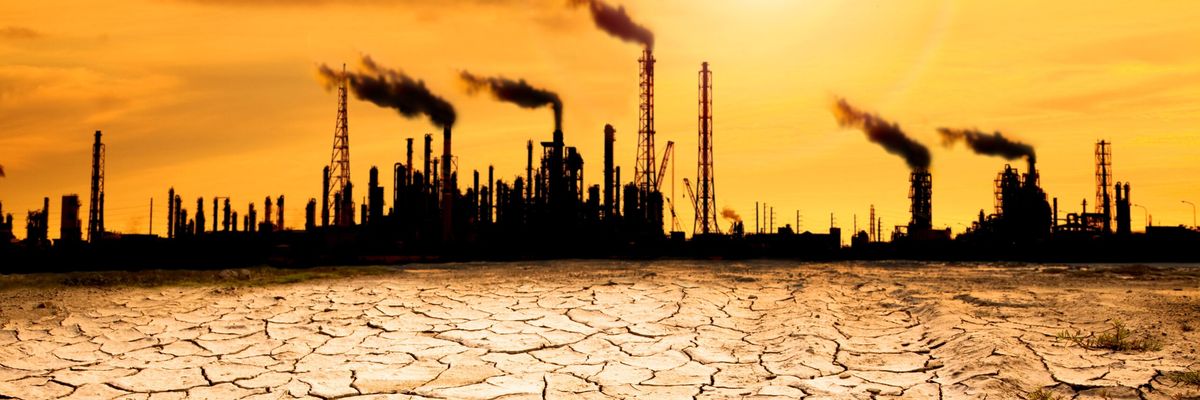The key outcomes of COP26 are now clear, and we must be clear-eyed in our response to them. Any chance of keeping the rise in global temperatures below 1.5 degrees Celsius is now lost. That means that whatever we do, by the middle years of this century vulnerable states around the world will be suffering severe and possibly politically fatal impacts from climate change. This is a threat to the world in general and the United States in particular that dwarfs rivalry with China, let alone Russia or Iran.
Even after the pledges made in Glasgow, it is predicted that by the end of the century temperatures will rise by around 2.4 degrees Celsius. If this occurs, it will lead to a real though unquantifiable possibility that climate change may escape from human control altogether, pushing temperatures up to a point where modern civilization will collapse.
Obviously therefore, the effort to reduce carbon emissions must continue and as far as possible be intensified. This means among other things the maintenance of existing nuclear power; huge efforts to develop new, cleaner and safer forms of nuclear power; and (as the Biden administration has emphasised) the prioritization of research into wholly new kinds of battery that will allow the storage of excess electricity produced by wind and solar power. For as we have seen in the United States and Europe over the past year, the inability to store solar and wind electricity when the wind is not blowing and the sun not shining remains a severe problem for alternative energy.
This will not be enough. The lesson of Glasgow is that steep and rapid reductions in the consumption of coal (the worst of the main carbon fuels in terms of effect on the climate) by China and India are simply not going to take place. Nor is it remotely likely that developed countries are going rapidly to abandon natural gas.
Therefore, to my mind, we also need greatly intensified research and development in the capture and sequestration of carbon from existing coal, oil and gas-fired plants. We need to begin research focused on technologies for geo-engineering in the Arctic; for example, the seeding of clouds to increase their capacity to reflect sunlight back into space. Research and development in these areas must take precedence over weapons development — which even if the Biden administration’s proposed measures are actually passed by Congress, will still be allocated three times as much as climate-related research in future U.S. federal budgets.
Here an analogy with wartime approaches is useful. In both world wars, countries on both sides poured money into the research and development of multiple alternative weapons systems, in the full knowledge that most of them would prove either flawed or completely useless; but the flawed ones were still better than no weapons at all, and the abortive projects were essential stepping stones to ones that worked.
In other words, I personally believe we must prioritize research and development into technologies to combat climate change over every other aspect of state expenditure; we must not be discouraged by failures; and if we cannot produce the technology ourselves we must buy it from others, or cooperate with them to produce it.
If we do all this, it is still possible for us to prevent local disasters from becoming global catastrophe. We also however need to have the moral courage to recognize that local disasters in especially vulnerable areas of the world like Central America, western Africa and South Asia are now inevitable, and that these will have extremely serious indirect consequences for the United States and Europe as well. U.S. global strategy must be designed to mitigate these disasters and their consequences for the West.
The danger comes not just from the direct impact of climate change in countries that are already experiencing very high temperatures and increasing water shortages. It is also that, as Pentagon reports have emphasised, climate change can act as a “threat multiplier”, exacerbating a range of existing social and political tensions to the point where states collapse.
For the western democracies, the most dangerous result will be the threat of greatly increased migration. As we can see from the history of the past decade and the present crisis on the U.S.-Mexican and Polish-Belarusian borders, the nativist reactions to mass-refugee flows can create international crises and increase radicalization and polarization. The domestic political consequences of mass refugee flows due to climate change risk destroying western liberal democracy long before the direct physical effects of climate change on the West become critical.
An enormous amount of attention has been paid by the U.S. (and to a lesser extent European) media and security services to Russian manipulation of Western politics and public opinion. We need to recognize however, both that external manipulation pales in importance compared to the impact on public opinion of actual developments in the real world; and that where such manipulation enjoys any success it is only because sufficient sections of the public are already radicalized.
Faced with this impending crisis, both the Left and the Right in Western countries need to develop much stronger elements of realism and national responsibility.
Americans and Europeans need to understand that Western aid to build resilience against climate change in countries most endangered by climate change is not some form of “charity”, nor is it required by justice. It is required by the vital interests of Western states themselves. Western aid needs to be radically reshaped and redirected to this end. In particular, the United States needs to devote greatly increased assistance to Central America — a neighboring region and the source of problems for the U.S. that are likely to increase greatly as a result of climate change — rather than supporting far-off geopolitical proxies like Ukraine and Georgia.
Finally, COP26 has demonstrated that as far as action against climate change is concerned, the geopolitical and ideological battle lines being drawn as part of the “new cold war” between the United States and China (and supposedly between “democracy” and “authoritarianism”) are at best irrelevant, at worse a disastrous distraction. The new U.S.-Chinese statement on cooperation work against combat climate change is a good step in the opposite direction — but it requires real content, and is at permanent risk of being destroyed by a new deterioration in the security relationship.
President Biden blamed the leaders of America’s rivals China and Russia for not turning up in Glasgow; Western cold warriors try to blame China as exclusively responsible for the continued mass consumption of coal; but in the end it was India and China together that watered down a commitment to abandon that fuel.
China generates the most emissions in the world by far, followed by the U.S. and India. Ranked by carbon emissions per capita, however, especially related to per capita income, America’s fellow “Anglo-Saxon” democracies Australia and Canada, as well as U.S. partners Saudi Arabia and Qatar, are all far worse polluters than China, India, or Brazil. When it comes to taking adequate action to limit climate change, no major state or political system in the world is innocent, and it is very unlikely that our descendants will see much difference between them.
















